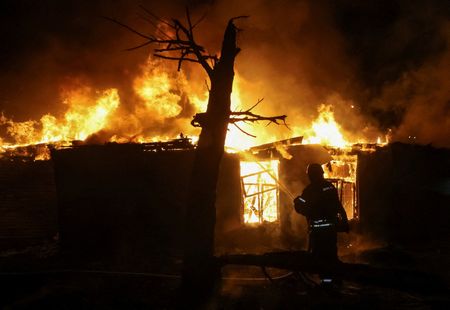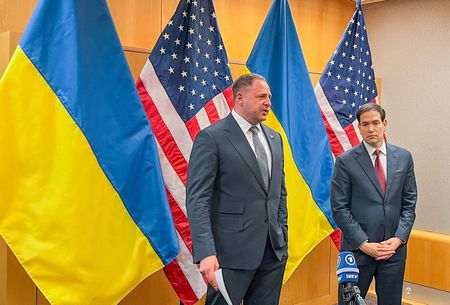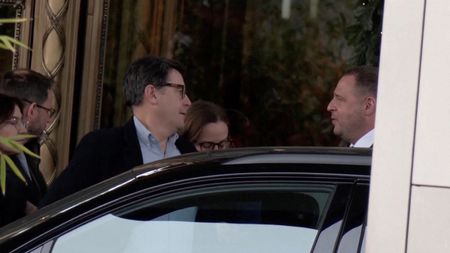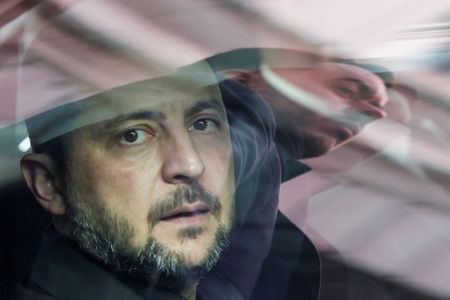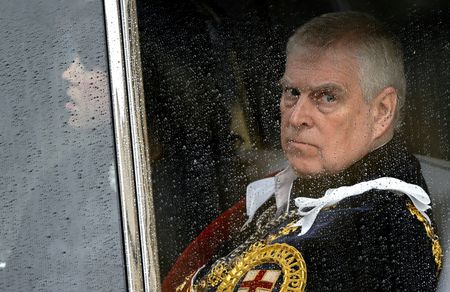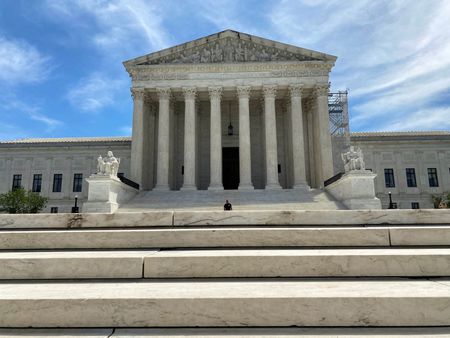By Max Hunder, Emma Farge and Olivia Le Poidevin
KYIV/GENEVA (Reuters) -U.S. and Ukrainian officials sought to narrow the gaps between them on Monday over a plan to end the war in Ukraine, after agreeing to modify a U.S. proposal that Kyiv and its European allies saw as a Kremlin wish list.
In a joint statement, Washington and Kyiv said they had drafted a “refined peace framework” after talks in Geneva on Sunday. Though there were no specifics, the dialogue received a cautious welcome from some of Ukraine’s allies.
Ukraine’s delegation to the talks with U.S. officials in Switzerland was returning home on Monday to report back, President Volodymyr Zelenskiy said.
U.S. President Donald Trump hinted at new progress.
“Is it really possible that big progress is being made in Peace Talks between Russia and Ukraine??? Don’t believe it until you see it, but something good just may be happening,” Trump wrote on Truth Social.
Later at the White House, spokeswoman Karoline Leavitt said there were a couple of points of disagreement remaining, but “we’re confident that we’ll be able to work through those.”
She said Trump wanted a deal as quickly as possible but there was no meeting currently scheduled between the U.S. president and Zelenskiy.
Zelenskiy said in his nightly video address that the plan has now incorporated “correct” points, but sensitive issues were to be discussed with Trump.
U.S. PLAN CAUGHT EUROPEANS OFF-GUARD
Since the summer, U.S. policy towards the war in Ukraine has zigzagged. Trump’s hastily arranged Alaska summit with Russian President Vladimir Putin spurred worries that Washington was prepared to accept many Russian demands, but ultimately resulted in more U.S. pressure on Russia.
The latest, 28-point peace proposal again caught many in the U.S. government, Kyiv and Europe off-guard and prompted fresh concerns that the Trump administration might be willing to push Ukraine to sign a peace deal heavily tilted towards Moscow.
The plan would require Kyiv to cede more territory, accept curbs on its military and bar it from ever joining NATO, conditions Kyiv has long rejected as tantamount to surrender. It would also do nothing to allay broader European fears of further Russian aggression.
Ukraine’s European allies drew up a counter-proposal which, according to a copy reviewed by Reuters, would halt fighting at present front lines, leaving discussions of territory for later, and include a NATO-style U.S. security guarantee for Ukraine.
Moscow, which described the initial reported U.S. plan as a potential basis for an agreement, rejected the European version.
“The European plan, at first glance … is completely unconstructive and does not work for us,” Kremlin foreign policy aide Yuri Ushakov told reporters in Moscow.
The sudden U.S. push raises the pressure on Ukraine and Zelenskiy, who is now at his most vulnerable since the start of the war after a corruption scandal saw two of his ministers dismissed and as Russia makes battlefield gains.
Zelenskiy could struggle to get Ukrainians to swallow a deal viewed as selling out their interests.
“Trump’s special plan is, in general, a capitulation for Ukraine,” said Anzhelika Yurkevych, a 62-year-old civil servant in Kyiv. “I think the Ukrainian people will not agree. Even if they sign, it needs to be implemented, the Ukrainian people will be the ones to do it. And they do not agree with this.”
After Sunday’s talks, no public statement was released on how the revised plan would handle contentious issues such as how to guarantee Ukraine’s security against future Russian threats, or how to fund the rebuilding of Ukraine. Zelenskiy said negotiations were ongoing.
KYIV STILL SEEKING COMPROMISES, SAYS ZELENSKIY
“We all continue working with partners, especially the United States, to look for compromises that will strengthen but not weaken us,” Zelenskiy said via video link from a separate meeting of Ukraine’s allies in Sweden.
Trump, who returned to office this year pledging to quickly end the war, has reoriented U.S. policy away from staunch support for Kyiv towards accepting some of Russia’s justifications for its 2022 invasion.
Zelenskiy could travel to the United States as soon as this week to discuss the most sensitive aspects of the plan with Trump, according to sources familiar with the matter.
Ukraine’s second-largest city Kharkiv was hit by what officials said was a massive drone attack that killed four people on Sunday. With smoke rising from the rubble, one man was seen crouched and holding the hand of a dead body.
“There was a family, there were children,” said Ihor Klymenko, Red Cross Commander of the emergency-response team in Kharkiv. “I can’t tell you how, but the children are alive, thank God, the man is alive. The woman died, unfortunately.”
Across the border, Russia downed 10 Ukrainian drones en route to Moscow, the Defence Ministry said. On Sunday, a Ukrainian drone strike had knocked power out for thousands of people near Moscow, a rare reversal of Russian attacks that regularly cause blackouts for millions of Ukrainians.
Some EU leaders met to discuss Ukraine on the sidelines of an EU-African Union summit in Luanda on Monday, with others dialling in. German Chancellor Friedrich Merz said Trump had expressed an openness to a jointly developed peace plan.
“And that is precisely what the representatives of Ukraine, the United States of America and the European member states achieved yesterday in Geneva,” Merz said in Luanda, describing the outcome of the talks as an “interim result”.
“But we also know: Peace in Ukraine won’t happen overnight.”
Polish Prime Minister Donald Tusk said any agreement must not weaken Ukraine or Europe. “This is a delicate matter because no one wants to discourage Americans and President Trump from having the United States on our side in this process.”
(Reporting by Max Hunder, Emma Farge, Olivia Le Poidevin, Anna Voitenko, Vitalii Hnidyi, Friederike Heine, Miranda Murray, Anna Wlodarczak-Semczuk, Alan Charlish; Steve Holland in Washington; Writing by Matthias Williams and Alex Richardson; editing by Gareth Jones, Kevin Liffey and Deepa Babington)

